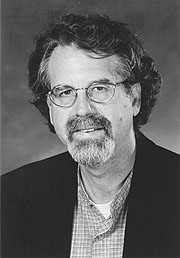![[Currents header graphic]](/homeart/currents_header.gif)
![[Currents header graphic]](/homeart/currents_header.gif)
April 19, 1999
By Tim Stephens
The Carnegie Foundation for the Advancement of Teaching has named UCSC professor of mathematics Bruce Cooperstein a Pew Scholar for 1999-2000. The award, which includes a stipend of $6,000, will support Cooperstein's efforts to improve teaching and learning in mathematics.

|
|
Bruce Cooperstein
|
The Pew Scholars National Fellowship Program, launched in 1998, is intended to create a community of scholars whose work will advance the profession of teaching and deepen the learning of students. Cooperstein will join 28 other Pew Scholars working under the auspices of the Carnegie Academy for the Scholarship of Teaching and Learning.
As part of the program, each of the Pew Scholars designs a project aimed at improving understanding of an important issue in the teaching and learning of his or her field. Cooperstein plans to develop a new course that will enable students to become more active learners of mathematics. He said he has spent a lot of time thinking about the teaching and learning of mathematics, both as a teacher and as chair of the Department of Mathematics from 1991 to 1998.
According to Cooperstein, a basic dilemma for the teaching of mathematics is how to strike a balance between teaching basic knowledge and skills and developing students' abilities to solve complex problems and make sense of abstract concepts.
"The course I have in mind will be devoted to problem solving in the context of learning some basic mathematical concepts," Cooperstein said. "Students will acquire mathematical knowledge by doing mathematics--by working on novel problems."
The goal is for students to develop problem-solving abilities that enable them to make sense of novel mathematical situations, he added.
Cooperstein plans to use a combination of approaches to document the impact of the new course on student learning. Ultimately, he hopes to revise a number of upper-division courses to integrate problem solving as an essential component of teaching and learning.
Cooperstein has been involved in numerous activities related to the advancement of teaching in mathematics. He is a principal investigator of the Monterey Bay Area Mathematics Project and a site director and work-group member of the Mathematics Diagnostic Testing Project, which develops and distributes mathematics examinations for public schools in California. He is also a member of the UC math/science reform group, an informal group of UC faculty, and a member of the UC Mathematics Faculty Forum, a group of representatives from all the UC campuses who meet to discuss vital issues of mathematics education.
As chair of the Mathematics Department at UCSC, Cooperstein made a point of emphasizing the importance of teaching. He began the practice of requiring candidates for faculty positions to give a teaching presentation in addition to a scholarly lecture. The presentation is videotaped and critiqued, and it plays a significant role in the department's hiring decisions, Cooperstein said.
"To my knowledge, UCSC remains the only research university with this practice," he added.
Cooperstein and the other Pew Scholars will come together for two ten-day summer institutes at the Carnegie Foundation offices in Menlo Park. The summer institutes will provide a forum for the scholars to share ideas and collaborate on projects.
Eileen Tanner, director of UCSC's Center for Teaching Excellence, said Cooperstein's efforts highlight the campus's commitment to excellence in undergraduate teaching. "It is our hope that showcasing his project here on campus will inform and inspire others on the faculty, whether in math or in other fields," Tanner said.
The Pew Scholars Program is part of the Carnegie Teaching Academy, a five-year, $6 million project funded by the Pew Charitable Trusts and the Carnegie Foundation for the Advancement of Teaching, in collaboration with the American Association for Higher Education.